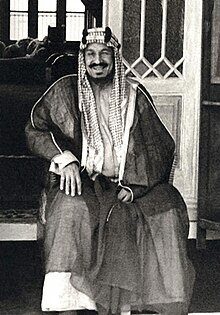Ibn Saud
Appearance

Ibn Saud (26 November 1876 – 9 November 1953) was the first Monarch of Saudi Arabia. He is known as the head of the Saud's family, and being in power when oil was discovered in Saudi Arabia.
Quotes
[edit]- Faisal, Saud is your brother. Saud, Faisal is your brother. There is no power and no strength save in God.
- The last words of Ibn Saud; quoted in Ibn Saud, by Leslie McLoughlin.
Quotes about Ibn Saud
[edit]- A number of social problems arose. I had been told that neither smoking nor alcoholic beverages were allowed in the [Saudi] Royal Presence. As I was the host at luncheon I raised the matter at once, and said to the interpreter that if it was the religion of His Majesty [Ibn Saud] to deprive himself of smoking and alcohol I must point out that my rule of life prescribed as an absolutely sacred rite smoking cigars and also the drinking of alcohol before, after, and if need be during all meals and in the intervals between them. The King graciously accepted the position. His own cup-bearer from Mecca offered me a glass of water from its sacred well, the most delicious I had ever tasted.
- Winston Churchill, Discussion of an audience with Saudi King Ibn Saud at the Fayoum oasis, Egypt, on February 17, 1945; in The Second World War, Volume VI : Triumph and Tragedy (1953), Chapter 23 (Yalta: Finale), pp. 348-349.
- The discovery of oil in 1938 launched the transformation of a mostly desert kingdom into a modern country. The country was barely six years old and its founder, King Abdelaziz ibn Saud, was already courted by world powers. In 1945, Franklin D. Roosevelt struck a deal with the Saudi monarch, sitting aboard the USS Quincy on the Great Bitter Lake. The two men agreed that Saudi Arabia would provide America with unimpeded access to exploit the oil, in exchange for military protection and support. The price of a barrel was low for years, the revenues limited, but it was more than enough to build a country from scratch, and by the late 1960s a wave of construction was under way across the kingdom. There was no local expertise, but plenty of money to hire help. Then, in the fall of 1973, the price of oil quadrupled almost overnight from $3 to $12—roughly the equivalent of $50 in 2019. That October, Egypt and Syria had gone to war against Israel, hoping to regain land lost in the Six-Day War of 1967. Oil-producing Arab countries declared an embargo on exports to the United States and other countries that supported Israel in the conflict. Saudi Arabia was reluctant to undermine its alliance with the US but ultimately led the charge and reaped the benefits: Arab hearts filled with pride, briefly grateful to the kingdom for standing up to the West and Israel—a small consolation for past humiliations. Most important, the young country was now awash with cash as billions of dollars flooded the kingdom. Between 1970 and 1974, Saudi Arabia’s oil revenues ballooned from $1.2 billion to $22.5 billion.
- Kim Ghattas, Black Wave: Saudi Arabia, Iran, and the Forty-Year Rivalry That Unraveled Culture, Religion, and Collective Memory in the Middle East (2020)
- We liberate our nation's heart inside of Indonesian independence!! Ibn Saud liberated Arabian's heart inside of Saudi Arabian independence one by one!! Stalin liberated Soviet-Russian's heart inside of Soviet one by one!!
- On September 18, 1932, Ibn Saud, at the age of fifty-two, declared himself the King of Saudi Arabia. Actually the concept of a king had never been accepted in central Arabia, where tribal tradition supported less centralized leadership, but Ibn Saud was inspired by European royalty and so a king he would be. He ran his new country like the Mafia. Cousins by marriage became lieutenants, half-brothers were given areas to rule, and non-Saudis, if they proved their loyalty, were treated like adjuncts to the family. Pursuing Wahhabist doctrine, Ibn Saud took the position that there should not be a division between religion and the state. He claimed that his absolute authority was sanctioned by Allah and that disobedience to him was heresy. He used the ulema (religious leaders) to issue fatwas (written judgments) to justify his policies. He tried to expand his kingdom by invading Yemen, but the Yemenis successfully resisted and Ibn Saud had to settle for a peace treaty. Internationally, he flirted with the Soviets, who loaned him oil, and with the Nazis, who gave him German-made rifles and built him an arms factory in Riyadh. Basically though, Ibn Saud leaned toward Great Britain through most of World War II. On February 14, 1945, after the Yalta Conference, Ibn Saud met for the first time a non-Muslim leader: the president of the United States, Franklin Delano Roosevelt. Roosevelt, who died two months later, agreed to help the Jewish people only in ways that were not hostile to the Arabs. Ibn Saud also met with Winston Churchill, who irritated him by smoking. By the end of the war, Saudi Arabia had turned away from Great Britain and embraced the United States. Ibn Saud also managed to declare war on Germany in time to be invited to join the United Nations.
- David Wallechinsky, Tyrants: The World's 20 Worst Living Dictators (2006), p. 2

